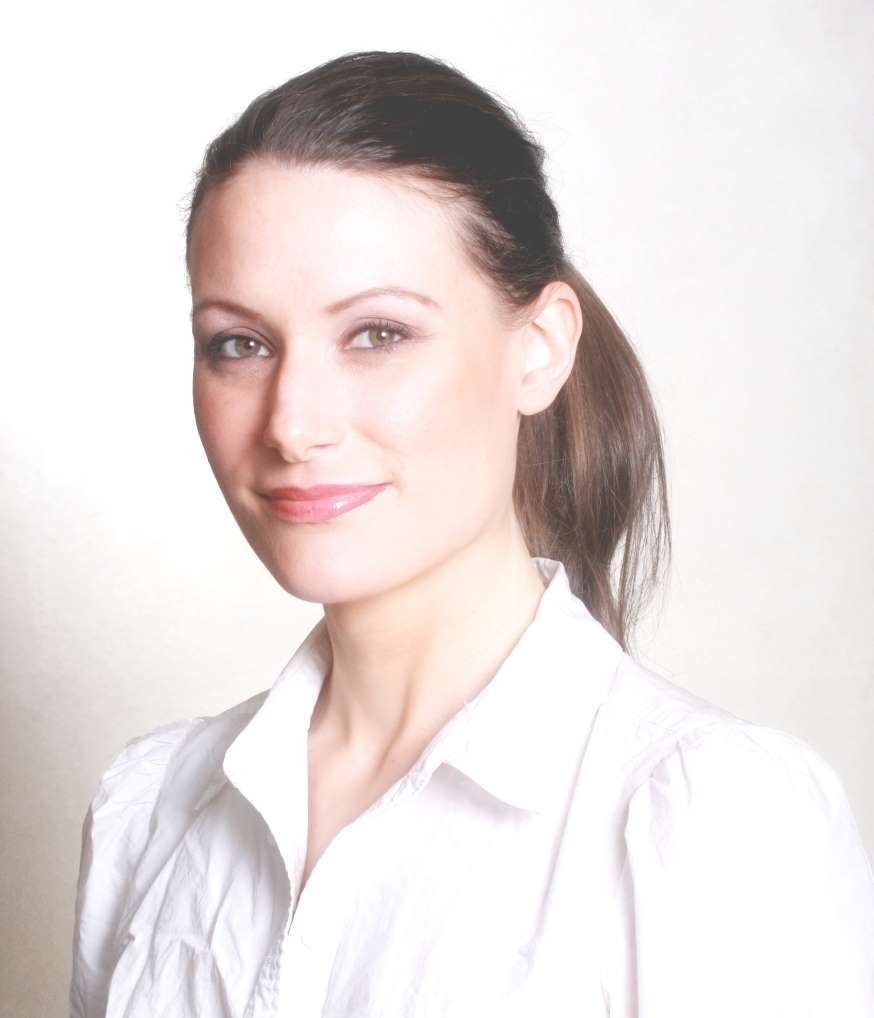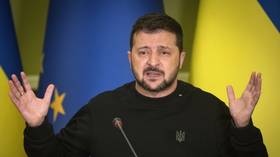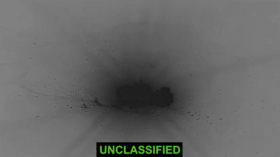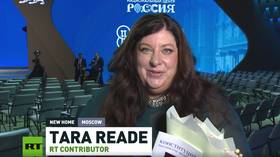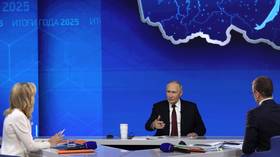The EU praises Ukraine’s ‘achievements,’ but in reality they are laughable

The European Commission just released a report card for countries seeking to join the European Union. And while Türkiye has been waiting on the sidelines for years, it now finds itself criticized and moving further away from accession for its unwillingness to drink on command the Kool-Aid that Brussels doles out.
Meanwhile, Ukraine is getting kudos for achieving the political equivalent of basic potty training – and even those achievements are debatable. “Ukraine has completed … well over 90% of the necessary steps that we set out last year in our report,” said European Commission President Ursula von der Leyen. What kind of dodgy bell curve grading is that?
There’s a term for what the EU is doing here. It’s called stringing someone along – in this case, with a participation trophy for effort. Ukraine and other countries, like Moldova and Georgia, want into the bloc. But the EU can barely afford to run what it has now, particularly with Germany and France – its economic engines – struggling from the EU’s own anti-Russian sanctions blowback on industry. Forget committing outright to taking on any more clown acts. So the European Commission is now issuing these condescending report cards, saying that Ukraine has met four of the seven pre-conditions, not for joining the bloc, but for just opening negotiations. Kiev still needs to de-corrupt, presumably to be more aligned with the rest of the EU’s corruption level, it’s being told – which let’s face it, is a pretty low bar. It also needs to de-oligarchize (because Europe only has one Queen, and that’s Ursula herself). It also needs to learn to play nice with minorities and respect their basic rights – like a preschooler needs to be told to do.
So what did Kiev do right, according to Brussels? It has “established a transparent pre-selection system for the Constitutional Court judges and reformed the judicial governance bodies,” the report says. But just last month, Reuters reported that Kiev was on a hiring spree of 2,000 judges amid a “huge shortfall” and EU pressure. Doesn’t sound like the situation is too stable, or resolved. Sounds instead like it’s cramming for an exam or rushing to be able to just tick a box. Granted, there has been a corruption crackdown documented by the mainstream media over the past several months, including the dismissal of the Supreme Court Chief Justice, but when corruption is so systemic and public trust in the judiciary is estimated to be in the single to low double digits, where’s the concrete proof that the new players are a substantial improvement over the old ones? You’d think that the EU might want to at least wait for an improvement in the public sentiment among Ukrainians before giving its stamp of approval.
“Ukraine has taken positive steps in a wider and systemic effort to address the influence of oligarchs,” the report concludes. But is that really the result of a deliberate cleanup – or just due to circumstances? The Wilson Center has detailed how “war was making an impact on the Ukrainian oligarchy by physically destroying the oligarch-owned industrial complexes.” Some oligarchs have fled Ukraine for places like the South of France, as Le Monde has reported. Does it count for Brussels as “de-oligarchization” efforts if Ukrainian oligarchs have fled to Europe with their considerable assets? Seems like perhaps Kiev is pulling the escalator up by the handrail on this particular “achievement” attributed to it.
Ukraine “has also demonstrated its capacity to make progress in aligning with the EU acquis, even during wartime,” the commission says, meaning compliance with basic EU rights and obligations. Not sure how Ukrainian President Vladimir Zelensky’s recent decision to cancel elections jibes with basic EU and democratic imperatives. No other candidate country could shrug off elections while demanding immediate EU ascension, as Zelensky has. But there seems to be a different standard for Ukraine when it comes to EU expectations.
Ukraine’s entire report card is riddled with “but Russia” or “but war” types of statements in what comes across as an effort to absolve Kiev of responsibility for its own shortcomings. No functional market economy? Blame Russia. As though there weren’t already problems before the conflict popped off, as suggested by Kiev’s ranking at the top of corruption lists. Problems with Ukraine’s respect for fundamental rights? Just gratuitously gripe about the “numerous violations by Russia.” How about freedom of expression? “Despite the context of a full-scale war, Ukraine is in between some and moderate preparation in the area of freedom of expression,” according to the report. Except that even Ukrainian journalists have reported being blocked from covering the conflict with government officials revoking journalist credentials, The Intercept reported in June 2023. Not that the EU itself is in any position to assess any other country’s media freedom, with its own habit of censoring dissenting voices, and using the pretext of the Ukraine conflict to slap a blanket ban on those distributed through Russian-based platforms from the very outset.
“Past enlargements have shown the enormous benefits both for the accession countries and the EU. We all win,” said von der Leyen. Know who doesn’t win? The taxpayers of EU nations paying for all this as net donors. Besides, it’s still better for the EU elites to keep these chancer countries on the hook, never sealing the deal, while exploiting whatever resources they have. Getting the milk without buying the cow. So there’s still no engagement date on the horizon. That’s probably a good thing, since I was just comparing Kiev to a toddler a few paragraphs ago.
And speaking of stunted maturity, Ukrainian officials are going all Fatal Attraction on Brussels, talking about how hard they’re trying to please – always the sign of a healthy relationship – and how much Brussels needs Kiev. “Our country should be in the EU. Ukrainians deserve this for their protection of European values and the fact that even during a full-scale war, we keep our word by developing state institutions,” Zelensky said.
Still, Ukraine needs to go work on itself, according to this humbling report card. For how long? Who knows. Accession talks could begin on December 12, if the entire bloc’s leaders agree. Which they may not. At least not without trying to squeeze out some concessions first, as Poland seems to be looking to do by demanding the exhumation of Poles killed by Ukrainian Nazis in the 1940s.
So with all the stumbling blocks that still remain for Kiev as a bossy child en route to the altar with Brussels, despite the rhetoric suggesting otherwise, there’s also the risk that Poland and others may ultimately want some kind of a kiss or concessions from Brussels in order to not be the guy who stands up at the wedding and objects to the union. And with Washington cooling on support and interest in Ukraine amid Israel’s conflict in the Middle East, the EU may be Ukraine’s only hope to keep funding the war against Russia – and likely only to a frozen state on Europe’s own border, at best. The whole sordid relationship between Brussels and Kiev is a folie à deux that risks ending in tears.
The statements, views and opinions expressed in this column are solely those of the author and do not necessarily represent those of RT.
